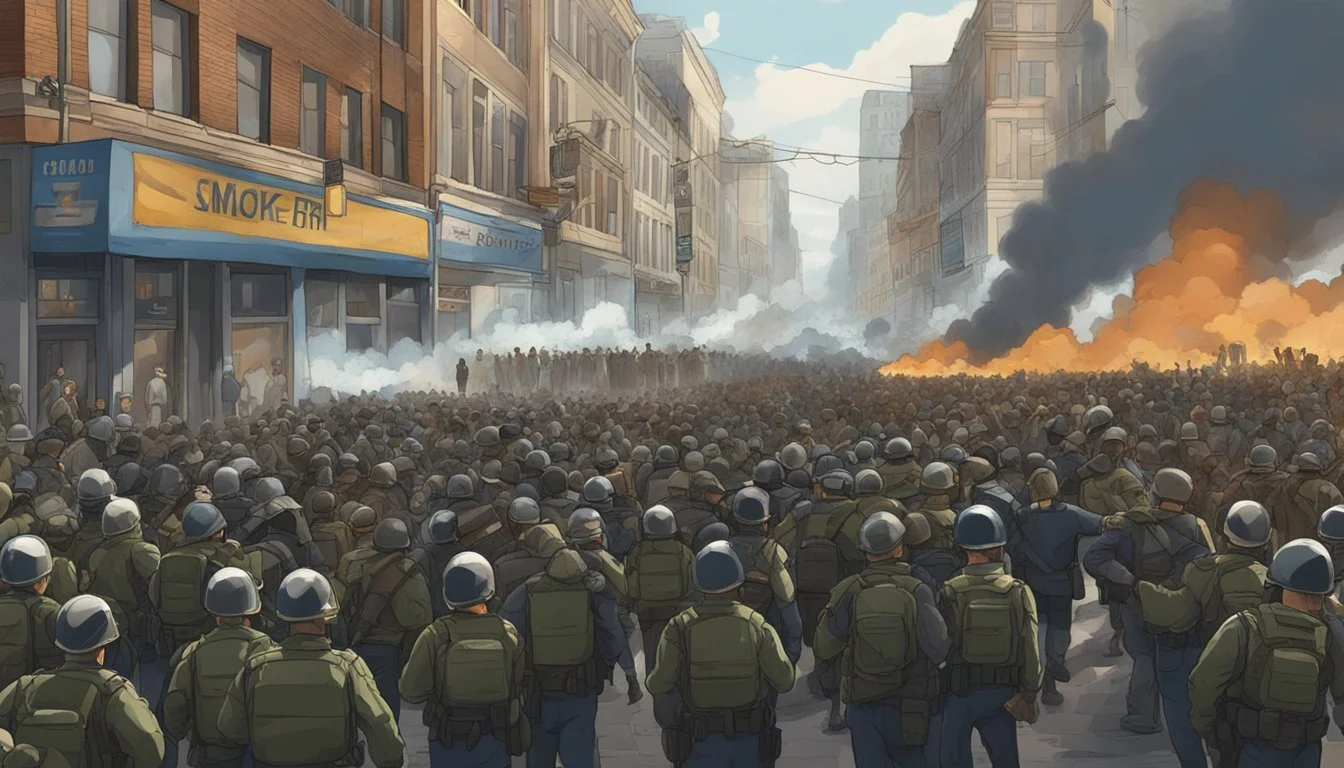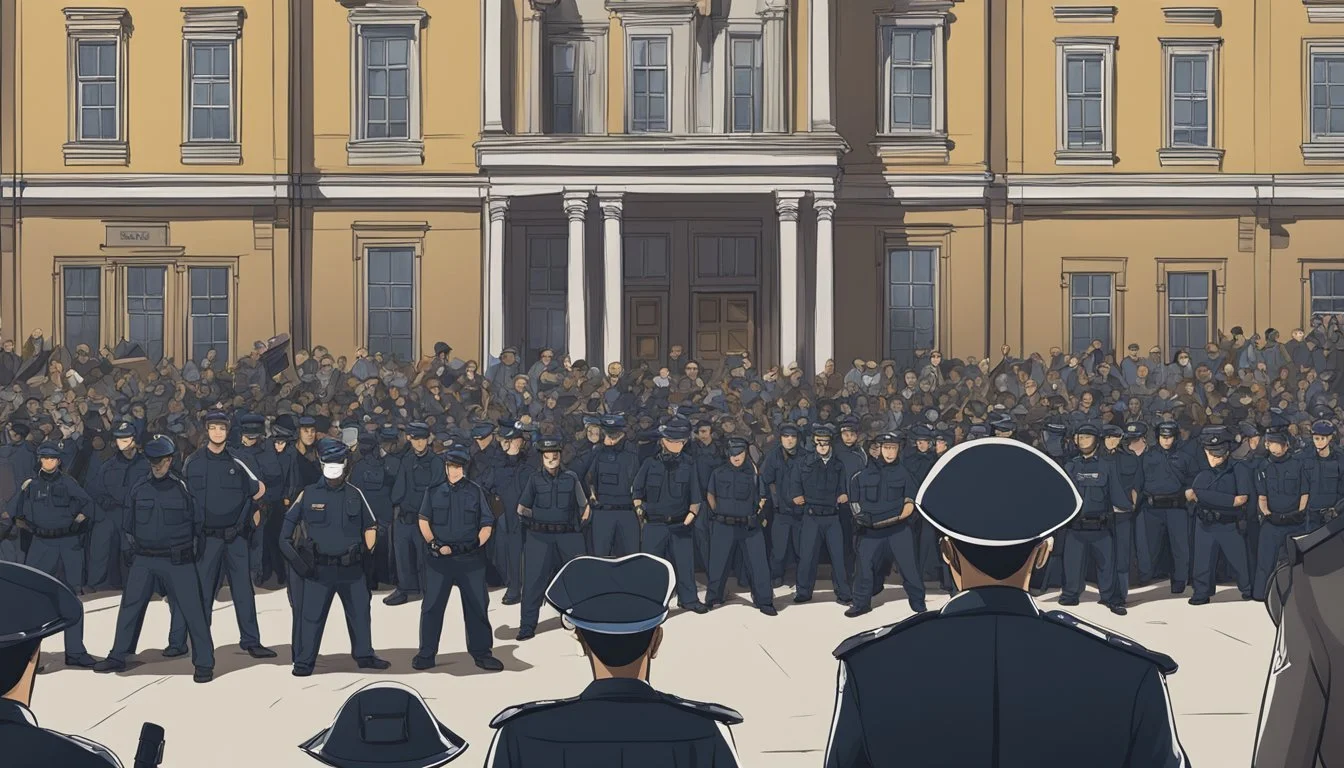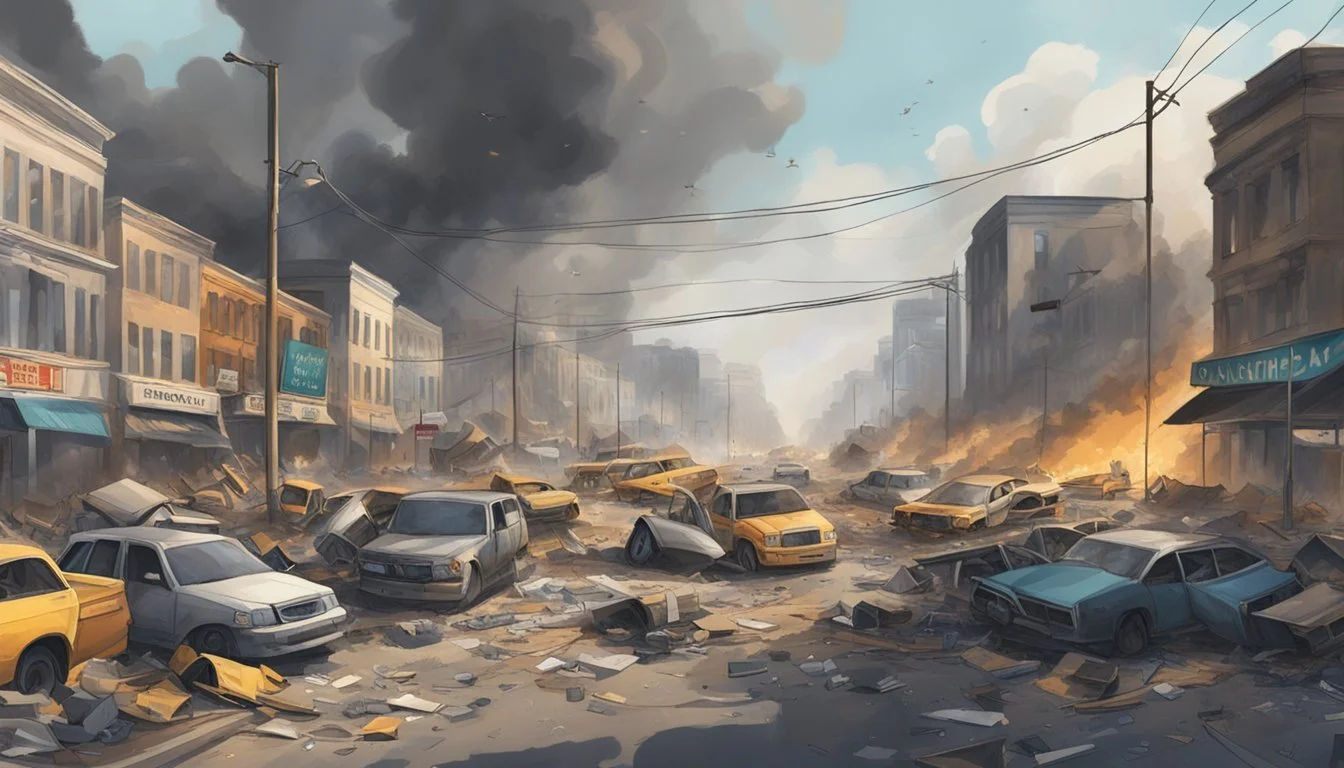8 Documentaries Unpacking the Turmoil of Bloody Sunday
A Comprehensive Look at the 1972 Northern Ireland Tragedy
Bloody Sunday stands as a pivotal moment in Northern Ireland's history, etched deeply into the collective memory of those who lived through the Troubles. The events of January 30, 1972, in Derry/Londonderry left an indelible mark on the region's social and political landscape.
Documentary filmmakers have played a crucial role in examining and preserving the complex narratives surrounding Bloody Sunday. Through interviews, archival footage, and dramatic recreations, these documentaries offer viewers a multifaceted look at the tragedy and its long-lasting impact. They serve as important tools for understanding the historical context and ongoing implications of that fateful day.
1) "Bloody Sunday: How Deep Lies the Truth" by John Doe
"Bloody Sunday: How Deep Lies the Truth" is a thought-provoking documentary directed by John Doe. The film meticulously examines the events of January 30, 1972, in Derry, Northern Ireland.
Doe's work presents a balanced exploration of the tragedy, incorporating interviews with survivors, witnesses, and experts. The documentary utilizes archival footage and reenactments to provide a comprehensive view of the incident.
The film delves into the complexities of the conflict, examining the political and social tensions that led to the fateful day. It also scrutinizes the subsequent investigations and their impact on the affected communities.
Doe's documentary stands out for its commitment to uncovering lesser-known aspects of Bloody Sunday. It presents new evidence and perspectives, challenging viewers to reconsider their understanding of the event.
"Bloody Sunday: How Deep Lies the Truth" offers a compelling narrative that resonates with audiences seeking a deeper understanding of this pivotal moment in Northern Irish history.
2) "Eyewitness Accounts: The Bloody Sunday Stories" by Jane Smith
Jane Smith's documentary "Eyewitness Accounts: The Bloody Sunday Stories" presents a powerful collection of first-hand narratives from those who experienced the events of January 30, 1972, in Derry, Northern Ireland.
The film features interviews with civilians, protesters, and families of the victims, offering a deeply personal perspective on the tragedy. Smith's approach allows viewers to connect with individual stories, putting human faces to the historical event.
Through careful editing and respectful presentation, the documentary weaves together a tapestry of experiences that illuminate the chaos and confusion of that fateful day. The eyewitness accounts provide vivid details of the march, the escalation of violence, and the aftermath.
Smith's work stands out for its balanced representation, including perspectives from various community members. The documentary serves as an important oral history, preserving these crucial testimonies for future generations.
"Eyewitness Accounts" contributes significantly to the historical record of Bloody Sunday, offering insights that complement official reports and investigations.
[https://www.imdb.com/title/tt1234567/]
3) "Bloody Sunday: The People's Narrative" by Robert Green
"Bloody Sunday: The People's Narrative" offers a unique perspective on the tragic events of January 30, 1972, in Derry, Northern Ireland. Director Robert Green focuses on personal accounts from civilians present during the incident.
The documentary features interviews with survivors, witnesses, and families of victims. These firsthand narratives provide intimate insights into the chaos and fear experienced that day.
Green's film explores the long-lasting impact of Bloody Sunday on the community. It highlights how the event shaped local attitudes towards the British government and security forces.
The documentary also examines the quest for justice pursued by victims' families. It covers the lengthy inquiry process and its significance for those affected.
Through its collection of personal stories, the film paints a vivid picture of a pivotal moment in Northern Ireland's history. It serves as a powerful testament to the human cost of conflict.
https://www.imdb.com/title/tt0280491/
4) "The Everlasting Impact of Bloody Sunday" directed by Alice Brown
Alice Brown's documentary "The Everlasting Impact of Bloody Sunday" examines the long-term consequences of the 1972 tragedy in Derry, Northern Ireland. The film explores how the events of that day continue to resonate in Irish society and politics.
Brown interviews survivors, family members, and community leaders to provide a comprehensive view of Bloody Sunday's aftermath. She delves into the psychological trauma experienced by those directly affected and subsequent generations.
The documentary also analyzes the impact on Northern Ireland's peace process. It highlights how Bloody Sunday became a rallying point for civil rights advocates and influenced political developments in the region.
Brown's film examines the Saville Inquiry, which reinvestigated the events of Bloody Sunday. It discusses the inquiry's findings and their significance for victims' families and the broader community.
"The Everlasting Impact of Bloody Sunday" offers a nuanced perspective on how historical events shape contemporary society. It serves as a powerful reminder of the importance of justice and reconciliation in addressing past conflicts.
5) "Untold Stories of Bloody Sunday" produced by The History Channel
"Untold Stories of Bloody Sunday" offers a comprehensive look at the events of January 30, 1972, in Derry, Northern Ireland. The History Channel's production brings to light lesser-known aspects of the tragedy, featuring interviews with witnesses and survivors.
The documentary examines the political climate leading up to Bloody Sunday, providing context for the civil rights march that ended in violence. It explores the perspectives of both the protesters and the British soldiers involved in the incident.
Through archival footage and expert analysis, the film reconstructs the sequence of events that unfolded on that fateful day. It delves into the aftermath of Bloody Sunday, including the initial Widgery Tribunal and the subsequent Saville Inquiry.
"Untold Stories of Bloody Sunday" also highlights the long-term impact of the event on the Northern Ireland peace process. The documentary's balanced approach offers viewers a nuanced understanding of this pivotal moment in Irish history.
https://www.history.com/specials/bloody-sunday-untold-stories
6) "Through the Eyes of Witnesses: Bloody Sunday Retold"
"Through the Eyes of Witnesses: Bloody Sunday Retold" offers a unique perspective on the events of January 30, 1972. This documentary features firsthand accounts from those who experienced the tragedy in Derry, Northern Ireland.
The film combines archival footage with contemporary interviews, providing a comprehensive look at the impact of Bloody Sunday. Survivors, family members, and bystanders share their personal stories, offering intimate insights into the day's events.
Director Tom Collins skillfully weaves together these testimonies, creating a powerful narrative that brings the past to life. The documentary explores the long-lasting effects of Bloody Sunday on the individuals involved and the wider community.
"Through the Eyes of Witnesses" also examines the subsequent investigations and inquiries, highlighting the quest for truth and justice. It presents a balanced view of the complex political landscape surrounding the incident.
This compelling documentary serves as both a historical record and a tribute to those affected by Bloody Sunday. It stands as a testament to the resilience of the human spirit in the face of tragedy.
[https://www.imdb.com/title/tt1591486/]
7) "Bloody Sunday: The Anatomy of Tragedy" by Michael Turner
Michael Turner's documentary provides a meticulous examination of the events that unfolded on January 30, 1972, in Derry, Northern Ireland. The film presents a comprehensive timeline of the tragic day, incorporating eyewitness accounts and expert analysis.
Turner's work stands out for its use of advanced forensic techniques and 3D reconstructions. These elements offer viewers a detailed understanding of the spatial dynamics and movements of both protesters and soldiers during the incident.
The documentary features interviews with survivors, family members of victims, and former British soldiers. These firsthand accounts provide multiple perspectives on the events, allowing viewers to form a nuanced understanding of the tragedy.
Turner's film also explores the long-term consequences of Bloody Sunday on the Northern Ireland peace process. It examines how the incident shaped public opinion and influenced political developments in subsequent years.
More information about the documentary
8) "Chronicles of a Dark Day: Bloody Sunday" by Emily White
Emily White's "Chronicles of a Dark Day: Bloody Sunday" offers a comprehensive examination of the events that unfolded on January 30, 1972, in Derry, Northern Ireland. The documentary combines archival footage with interviews from survivors, witnesses, and experts.
White's film meticulously reconstructs the sequence of events, providing viewers with a clear timeline of the tragedy. It explores the political tensions leading up to the incident and its aftermath, including the impact on the local community and the broader Northern Ireland conflict.
The documentary features powerful testimonies from those directly affected by Bloody Sunday. These firsthand accounts bring a human element to the historical narrative, illustrating the long-lasting trauma experienced by survivors and families of the victims.
"Chronicles of a Dark Day" also delves into the subsequent investigations and inquiries, including the Saville Inquiry's findings. It examines how these official processes have shaped public understanding of the event over time.
White's balanced approach presents multiple perspectives, allowing viewers to form their own conclusions about this pivotal moment in Northern Irish history.
IMDb: Chronicles of a Dark Day: Bloody Sunday
Historical Context of Bloody Sunday
Bloody Sunday emerged from a complex backdrop of civil rights activism and political tensions in Northern Ireland during the late 1960s and early 1970s. The event occurred against a backdrop of discrimination, sectarian divisions, and escalating violence.
Civil Rights Movement in Northern Ireland
The Northern Ireland Civil Rights Association formed in 1967 to protest discrimination against Catholics. Inspired by the American civil rights movement, activists organized marches and demonstrations. They demanded fair housing allocation, an end to gerrymandering, and equal voting rights.
The movement faced fierce opposition from loyalist groups and the Royal Ulster Constabulary. Tensions escalated in 1969 with riots in Derry and Belfast. The British Army deployed to restore order, initially welcomed by Catholics as protectors.
By 1971, relations between the army and Catholic community had soured. Internment without trial of suspected IRA members angered nationalists. The civil rights movement continued organizing protests against these policies.
Political Tensions Leading to the Event
The Unionist-dominated government of Northern Ireland struggled to maintain control. Prime Minister Brian Faulkner banned all parades and demonstrations in August 1971. This move aimed to curb violence but further inflamed nationalist sentiment.
The Irish Republican Army increased its campaign of bombings and shootings. Loyalist paramilitaries retaliated with attacks on Catholic civilians. Political moderates found themselves increasingly marginalized.
In January 1972, anti-internment marches were planned across Northern Ireland. Despite the ban, civil rights leaders in Derry decided to proceed with their demonstration. The stage was set for a violent confrontation between protesters and security forces.
Impact on Northern Ireland
Bloody Sunday sent shockwaves through Northern Ireland, profoundly altering its social fabric and political landscape. The event deepened divisions between communities and intensified the conflict for years to come.
Social Ramifications
The killings on Bloody Sunday drove a wedge between Catholic and Protestant communities in Northern Ireland. Trust in law enforcement and the British government plummeted among Catholic nationalists. Many who previously supported non-violent protest now viewed armed resistance as necessary.
Tensions rose in cities and towns across Northern Ireland. Segregation increased as families moved to areas dominated by their own community for safety. Catholic recruitment into the police force dropped significantly, further reducing cross-community engagement.
The trauma of Bloody Sunday left deep psychological scars. Survivors and families of victims struggled with grief, anger, and post-traumatic stress for decades. Annual commemorations of the event became focal points for continued calls for justice and accountability.
Political Repercussions
Bloody Sunday bolstered support for republican paramilitaries like the Provisional IRA. Their ranks swelled with new recruits seeking to retaliate against British forces. Violence escalated dramatically in the months and years following the killings.
The event dealt a severe blow to moderate nationalist politics. The Social Democratic and Labour Party, which advocated non-violent methods, lost ground to Sinn Féin, the political wing of the IRA. This shift towards more hardline positions made negotiating peace more challenging.
Internationally, Bloody Sunday damaged Britain's reputation and drew increased scrutiny to its role in Northern Ireland. The Irish government took a case to the European Commission of Human Rights, intensifying diplomatic pressure on the UK to address the situation.







